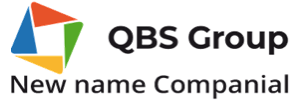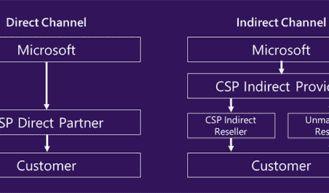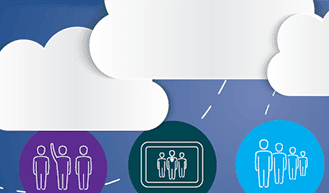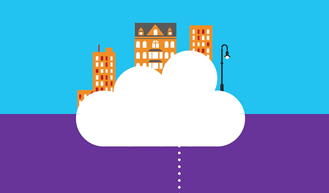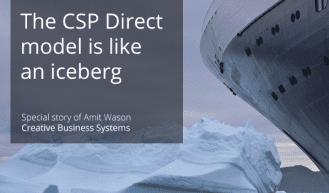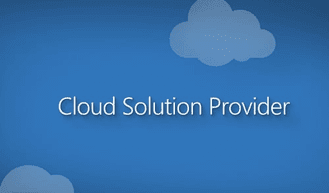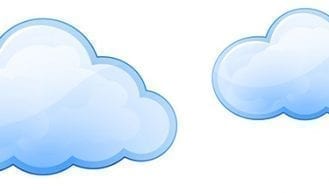Fantastic new opportunities for Dynamics partners why and how you can join the CSP program
CSP
The Microsoft Cloud Solution Provider (CSP) program offers Microsoft Dynamics partners fantastic new opportunities. These opportunities are even bigger for partners who target SMB’s.
To understand the opportunities CSP offers Microsoft Dynamics partners, it is good to look at its origin. It all started when Microsoft teamed up with Telco-Operators to work on a program called ‘Syndication’. This was when the predecessor of Office 365, Business Productivity Online Solution (BPOS, what a wonderful name) launched.
Microsoft wanted to make sure that operators, who sold internet access to end customers, could bundle that access with the online versions of Exchange and Sharepoint and sell it as one package. That way end customers didn’t know how much of their monthly fee was used for pure internet access, additional services and software solutions such as Exchange. It provided opportunity to “hide” margin within the various packages.
While Operators found it hard to sell BPOS in the first place, more and more companies got interested in the idea of selling Microsoft Online Services integrated in their own offering. Yet Microsoft needed to onboard each of the Syndication Partner manually, which was extremely resource intensive. So it became clear that in order let BPOS succeed, Microsoft needed to provide a scalable platform, which then led to the Cloud Solution Provider Program (or Project Artemis as it was called back then).
The biggest benefit of the Microsoft CSP program
At first glance, you might say that CSP is another licensing option, tailored for online services, which is true. But then it is also a transactional platform for resellers and wholesalers alike. Having a platform that enables partners to have automated provisioning and billing of Microsoft online services is a critical element of Microsoft’s cloud transformation agenda.
However, the biggest benefit of CSP as a platform comes from the opportunity to allow partners around the globe to integrate Microsoft cloud services in their own offerings. More and more, the line of business decides which IT solutions are being used and not the IT department. This means that more and more, decision makers want to get pay-as-you-go models that have one price for entire solutions in very predictable way. This can be achieved by creating your own products that consist of Microsoft online services, third party solutions, your own services – online or classical – which are offered in a by-user, by-month framework.
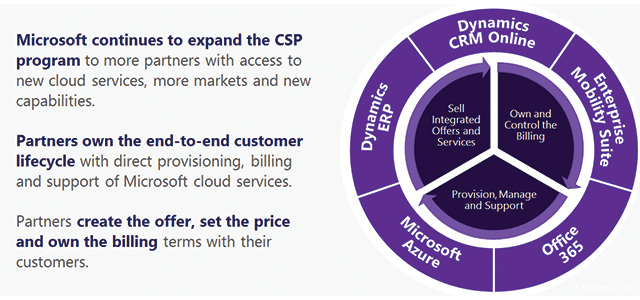
Cloud opportunities, especially for SMB
The opportunities CSP creates are especially true for SMB’s. In the traditional Business Application space, solutions were defined as being projects. Typically with high upfront costs and then maintenance. In the new cloud economy, these solutions should become easy to deploy packages that can be sold at scale to SMB’s. SMB’s typically accept standards more easily than enterprise customers, which is why market research predicts that SMB’s will consume public cloud services faster than their enterprise counterparts. This opens a fantastic opportunity for Dynamics partners, creating packages around industry expertise or business processes that can include Microsoft cloud services, other ISV solutions and their own IP and services. We are seeing great examples right now, like Tempero from Netherlands, Cloud2020 from United Kingdom or OneBizz which is actually part of QBS group.
How to become a CSP partner
Before you can actually create and transact CSP offerings, you need to become part of the CSP program with Microsoft. To do that you have two options: you can become a direct CSP or a CSP reseller. (Read also: What is the Microsoft CSP Program) As a direct CSP you have to make a large investment to set up the automated billing and provisioning platform. The full advantage of the CSP platform comes from the automation, for example you or customer can add or cancel seats of your cloud solution package directly and the billing and provisioning will be adjusted automatically. Microsoft estimates that this can cost you more than € 375.000,-. Arguably if you only have a handful of customers, you can continue to invoice manually on a monthly basis. But as soon as you have more than 20 customers, the cost of keeping up with changes will eat into your profitability big time, thus increasing your need for automation.
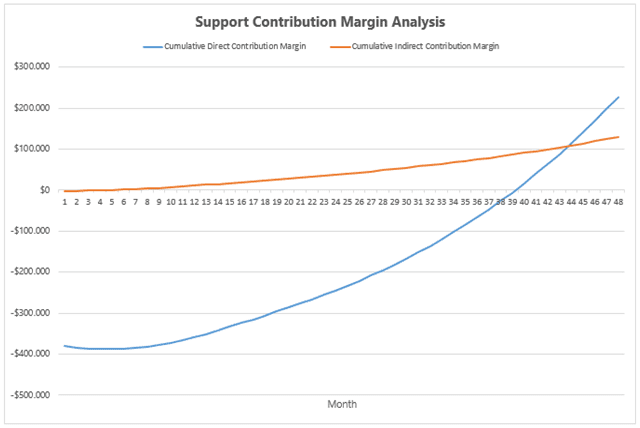
Become a CSP reseller
But you can also become a CSP reseller. In that scenario a cloud aggregator such as QBS group would provide the heavy lifting in terms of the automation platform, while you can focus on creating and selling your packaged offerings. There are some costs involved, the margins you receive on the Microsoft public cloud offerings are slightly smaller. But these costs are small compared to the all up margin you can make with cloud service packages you create. In fact Microsoft calculation suggest that only after two years and more than 500 customer you might be getting break even on your own CSP investment versus becoming a CSP reseller within the QBS network.
Getting started with CSP Program.
I strongly believe we are just getting started with packaged cloud services. At QBS group we have invested heavily in our platform to provide automated billing and provisioning for our partners. We also offer them a portfolio of third party solutions and cloud solutions (such as OneBizz) that they can integrate into your own cloud services packages.
The easiest way to benefit from the Cloud Solution Provider Program opportunity is to sell an anchor service to your installed base.
The easiest way to benefit from the Cloud Solution Provider Program opportunity is to sell an anchor service to your installed base. In most cases, that will be Office 365. If you combine it with OneBizz 365 and add your own services, you have made the first important step, creating your cloud service product. We at QBS are eager to support you in this step. If you think this is worth investigating, then please contact QBS group.
Want to get in touch with me personally?
Send an email to mhartmann@qbsgroup.com

